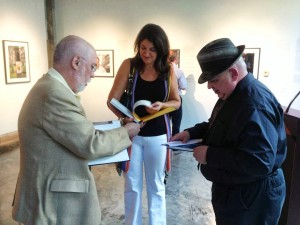
Photo credit: JohnPotter Pixabay
By Debbie Burke
Why does a writer choose to tell a story from a particular point of view?
Recently, Chuck, a regular TKZ reader, emailed me with questions about omniscient point of view. He wanted to write the first chapter of his revenge-theme murder mystery from the omniscient POV.
Right away, I knew I wasn’t qualified to advise him. I’ve never written anything omniscient. The books I read rarely use it because my personal taste has always favored close, intimate POVs.
So I dove down the research rabbit hole to learn more about this mysterious POV.
Masterclass.com offers this definition:
An omniscient narrator is all-seeing and all-knowing…The narrator may occasionally access the consciousness of a few or many different characters.
Some writers use this perspective to create a more “godlike” or deliberately “authorial” persona that allows them to comment on the action with the benefit of distance.
Before TV, films, internet, and streaming, most people didn’t venture far from the places they were born. Travel was the domain of the wealthy.
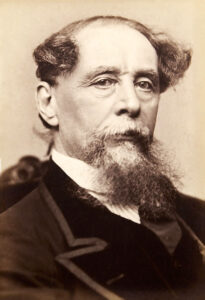
Charles Dickens – Wikimedia
Therefore, books were ships that carried readers to distant shores they would never personally set foot on; to exotic worlds constructed from the author’s descriptions; to smells, sights, sounds, textures, and tastes readers could only imagine.
World building was crucial.
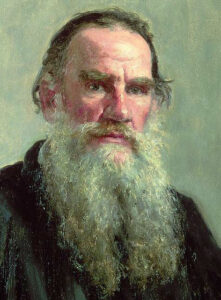
Leo Tolstoy – CC BY-SA 3.0
Authors like Dickens, Tolstoy, and Tolkien spent many pages explaining the physical, social, religious, economic, historic, and psychological elements of the story world.
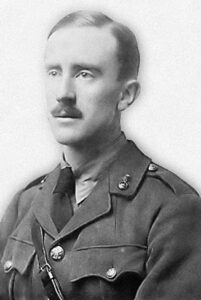
J.R.R. Tolkien – public domain
But as communication increased and the world became smaller, authors no longer had to paint such detailed pictures.
Reader interest shifted to characters who were fascinating or with whom readers could identify. They wanted go deeper into the characters’ hearts and minds to vicariously experience their fears, elation, rage, joy, doubt, guilt, pride, disappointment, lust, etc.
In today’s book market, close third and first person POVs are the most prevalent, although epic fantasy with its detailed world building still uses omniscient POV.
According to a 2016 New York Times article by Elliott Holt:
The effects of omniscience are authority and scope; novels with such narrators seem especially confident. The characters may be uncertain, but we sense the controlling force above them. Omniscience reinforces that we are reading fiction.
Some readers like that quality while others see it as authorial intrusion.
Holt goes on to say:
We know we’re being watched, by traffic and security cameras, by our employers, by the N.S.A., by random people taking pictures with their phones. We’re aware of the threat of hackers and cybercrime…Technological transcendence is “spooky”: Perhaps omniscience taps into this collective fear about loss of privacy.
Hmm. That explains why I personally avoid omniscient POV.
The most comprehensive article I found about omniscient POV is by John Matthew Fox of Book Fox at this link.
John provides clear, understandable explanations. For instance, in discussing show vs. tell, he says:
Third person omniscient is often more telling than showing, because the narrator is an objective observer. It’s like you’re telling someone about a movie you just saw.
He defines two types of third-person omniscient POV:
Objective: The narrator knows all, but they’re an observer. They can’t get into the characters’ heads, but are telling the story from somewhere outside.
Subjective: The narrator is an observer with opinions. We get a sense of what the narrator thinks about every character, in a judgy kind of way.
He says one advantage is the narrator “can dispense information that no character knows.” But he cautions: “many writers slide over into head hopping.”
He goes on to elaborate:
Where this gets confusing, especially for new writers, is in third person omniscient. Some newer writers think that head hopping and third person omniscient are the same thing, or at least close. This is not true. Third person omniscient tells a story from one perspective: the narrator’s. The narrator shouldn’t tell us the thoughts and feelings of all the characters, or any of the characters.
The narrator shows us how the characters feel through action and dialogue, not by hopping into the character’s heads to reveal what they’re thinking. The story is told from the narrator’s perspective, like the narrator is a character.
Here is John’s most compelling argument against using omniscient POV:
Literary agents and publishers are so reluctant to consider third person omniscient, and they’re not going to do it for a new writer. If you really want to try third person omniscient, do it for a very limited time, like the first chapter, to describe the setting. Sort of like a wide shot in a movie, writing the first chapter in third person omniscient can work.
~~~
As writers, we like to experiment with new ways to tell stories. Some experiments work, others fall flat, and a few explode in our faces.
After researching, my suggestions to Chuck are:
Examine your motive for using omniscient. Why is it the absolute best way to introduce your story? If it’s merely a gimmick or experiment, rethink the choice.
Run the first chapter by critiquers and beta readers. They’ll help you judge if it works or not.
Before submitting to agents or editors, understand that many are predisposed to dislike it.
If you use omniscient POV, be darn sure it’s done correctly and effectively.
~~~
TKZers: Please share books you’ve read that use omniscient POV. Which work and which don’t?
Why do you like or dislike omniscient POV?
~~~
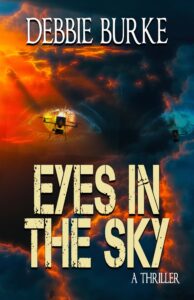
In Debbie Burke’s thriller Eyes in the Sky, a drone gives an omniscient–and sinister–point of view. Please check it out at these links:

